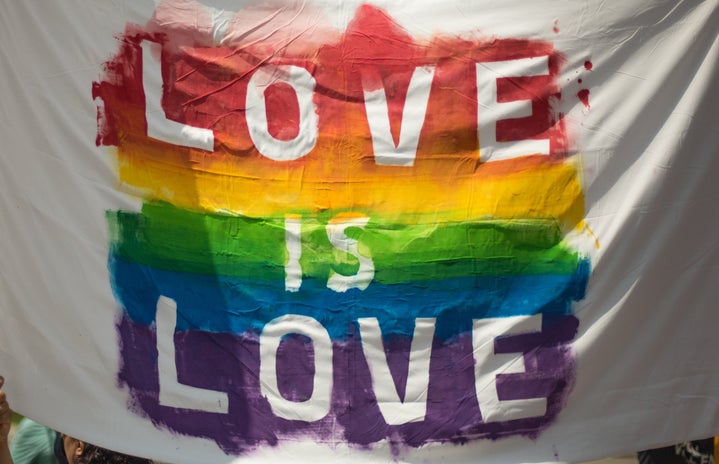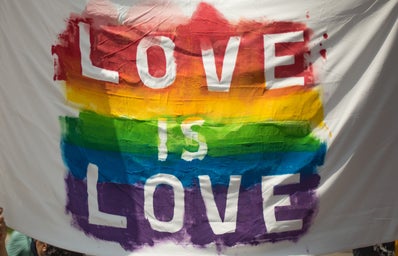The Prom is a 2020 Netflix comedy musical. It touches on many LGBTQ+ topics in a personal way ranging from teen love to adults reconnecting with their parents. Well-known stars led this film including Meryl Streep, James Corden, Nicole Kidman, and more. The Prom is Jo Ellen Pellman’s film debut where she stars as Emma Nolan, a teen girl who just wants to attend the prom with her girlfriend.
One of the main characters, Emma, is dating Alyssa Greene, who is closeted and just so happens to be the daughter of the head of the Parent-Teacher Association (PTA). Mrs. Greene, who is unaware of her daughter’s relationship with Emma, announces that the prom will be canceled because of Emma’s wish to defy traditional Indiana beliefs by taking her girlfriend to the prom. The actual principal of the school, Tom Hawkins, supports Emma in being who she is. The Prom is an incredibly inclusive film. We get to witness the struggles of being a lesbian in high school and dealing with bullying, and seeing Alyssa Green struggle with being closeted out of fear of the backlash from her mother. Emma and Alyssa are an interracial couple, which adds to the intersectionality of the story.
News of the prom being canceled circled to dwindling broadway stars Dee Dee Allen (Meryl Streep) and Barry Glickman (James Corden) who are seen as selfish, arrogant and thus begin to lose fans, which causes their show of Eleanor! to get bad reviews. To save their careers, they search for a cause to get behind that will make them look good. They find Emma’s story online and flock to Indiana with some other small-time famous people and a dance crew.
Adding on to the diversity of the film, Barry Glickman, is a gay adult man who we see come to terms with his own childhood trauma of not going to his prom and leaving home at a young age after coming out to his parents, who he hasn’t talked too in over 15 years. There was an understandable backlash that a real member of the LGBTQ+ community didn’t play the character of Barry Glickman. We see the character have a heart-to-heart with his mother about how they left things in the past, which many people in the LGBTQ+ community can relate to.
Emma’s character herself was thrown out of her parent’s home at 16 when she came out and then began living with her grandmother. We got to see the grandmother express how hard it was to watch her daughter cut ties with Emma.
Meryl Streep’s Dee Dee character expressed the pain of her divorce that she’s been dealing with for years after having a hard time coping with the pain of being used throughout her relationship. We see her finally began to heal and date the principal, Tom. Tom breaks down toxic masculinity in his own right by expressing that he is a fan of the theater and how theater mentally helps him in his life. There is a moment between Dee Dee and Tom where Dee Dee’s character points out that most of her fans are not like him, meaning that most of her fans are not straight men. It can be extremely healthy for men who may have been taught to hide their emotions and embody toxic masculinity to see a strong African American man loving the theater in how Tom’s character does.
The film tackles bullying. The homophobic students of the high school and head PTA member Mrs. Greene threw together a horrible makeshift prom in the gym for Emma and had the real prom for everyone else at a private club. We see how Emma copes with that betrayal’s pain and how her own girlfriend doesn’t come to be with her out of fear that her mom will find out.
Eventually, things work out with the stars hosting their own inclusive prom for Emma, the LGBTQ+ community from all over the area, and any allies. Alyssa emotionally confesses her sexuality to her mother, who eventually accepts and supports her.
The film encompasses so many different scenarios of real-life families, inclusivity, diversity, and real people’s struggles. It wasn’t perfect. More of the actors could have been a part of the LGBTQ+ community, and the film starts off slow. It is worth it to keep watching. Overall, the messages and lessons taught throughout the film are genuinely astonishing. It’s a step in the right direction for having more films that real people can actually relate to.
P.S. The film is loosely based on Mississippi teen Constance McMillen, who wanted to go to the prom with her girlfriend in 2010. Many celebrities ranging from Green Day to Lance Bass came together to put on an inclusive prom for everyone.


